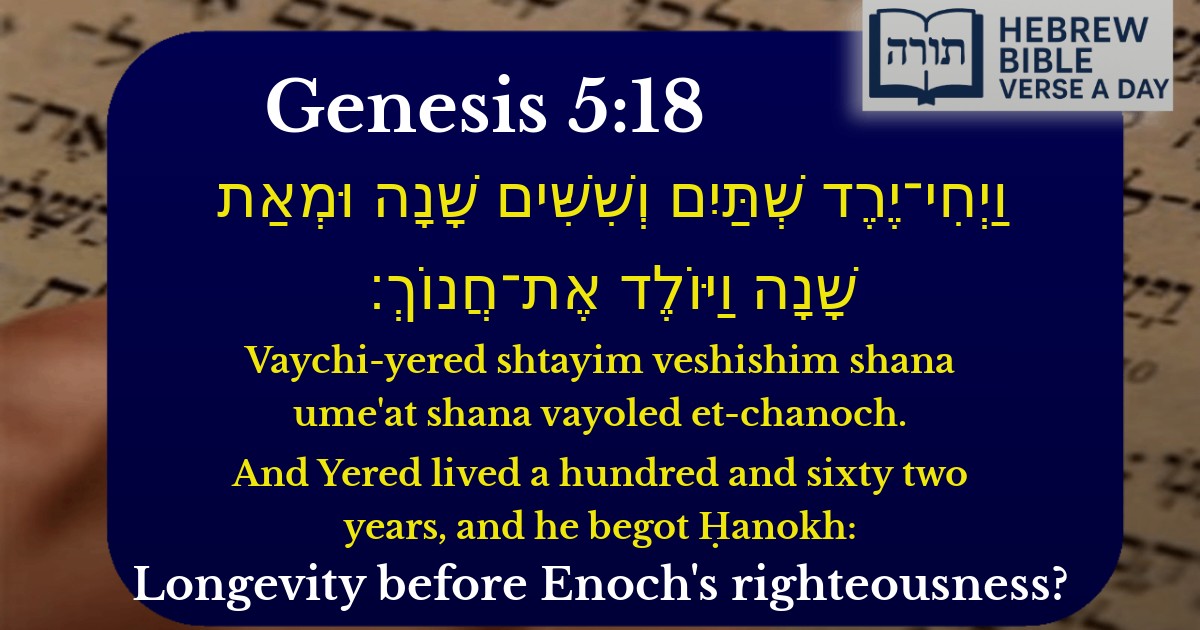Frequently Asked Questions
Q: How old was Yered when he had his son Chanokh?
A: According to Genesis 5:18, Yered was 162 years old when he fathered Chanokh. This is part of the genealogy listed in the Torah tracing the generations from Adam to Noach.
Q: Why does the Torah list the ages of these early generations?
A: The Torah lists the ages and generations to show the lineage from Adam to Noach, emphasizing the continuity of humanity. Rashi explains that these detailed genealogies teach us about the gradual decline in lifespans before the Flood, as well as the importance of each generation in transmitting righteousness or corruption.
Q: Who was Chanokh (Hanokh) in the Torah?
A: Chanokh (also spelled Hanokh or Enoch) was the son of Yered and father of Metushelach (Methuselah). Unlike others in his generation, the Torah (Genesis 5:22-24) states that Chanokh 'walked with G-d' and was taken by G-d at a relatively young age (365 years). Midrashim describe him as a righteous man who served as a teacher of justice.
Q: Why did people live so long in the early generations?
A: According to Jewish tradition (as explained by Ramban and others), people in the early generations lived longer because the world was closer to its original perfected state after Creation. As sin increased, lifespans gradually decreased. The Zohar also teaches that the pre-Flood generations had stronger physical constitutions.
Q: What lesson can we learn from Yered having a child at 162?
A: The fact that Yered had a child at 162 (and others in this parsha had children at advanced ages) teaches that having children is always a blessing from Hashem, regardless of age. The Talmud (Eruvin 18b) derives from these verses that having children is part of humanity's purpose, as G-d commanded Adam to 'be fruitful and multiply.'


The Lifespan of Yered and the Birth of Ḥanokh
The verse states: "And Yered lived a hundred and sixty-two years, and he begot Ḥanokh" (Bereshit 5:18). This passage appears in the genealogy of Adam's descendants before the Flood, emphasizing the longevity of the early generations.
Rashi's Explanation
Rashi (Bereshit 5:18) notes that Yered's lifespan was significantly long, as were the lives of his contemporaries before the Flood. He connects this longevity to the fact that the world was still in its early stages, and the divine decree of shortening human life (as seen later in history) had not yet taken effect. Rashi also highlights that Yered fathered Ḥanokh at the age of 162, which was relatively young compared to others in his lineage (e.g., Metushelach, who fathered Lemech at 187).
Midrashic Insights
The Midrash (Bereshit Rabbah 23:4) elaborates on the name Ḥanokh, deriving it from the root ח.נ.ך ("to educate" or "to dedicate"). It suggests that Ḥanokh was a righteous figure who "dedicated" himself to divine service, setting him apart from the corrupt generation before the Flood. Some Midrashic sources also associate Ḥanokh with wisdom and prophecy, as he is later described as one who "walked with G-d" (Bereshit 5:24).
Rambam's Perspective
Rambam (Moreh Nevuchim 2:6) discusses Ḥanokh's unique spiritual ascent, interpreting his "walking with G-d" as a metaphor for achieving intellectual and ethical perfection. Unlike others in his generation, Ḥanokh devoted himself entirely to divine wisdom, meriting an early departure from this world (as he was "taken" by G-d at 365 years, an unusually short lifespan for his time).
Significance in the Genealogy